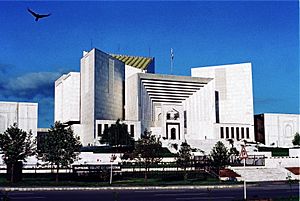Nazim Hussain Siddiqui facts for kids
Quick facts for kids
Nazim Hussain Siddiqui
ناظم حسین صدیقی |
|
|---|---|
| 19th Chief Justice of Pakistan | |
| In office 31 December 2003 – 29 June 2005 |
|
| Appointed by | Pervez Musharraf |
| Preceded by | Sheikh Riaz Ahmad |
| Succeeded by | Iftikhar Muhammad Chaudhry |
| Chief Justice Sindh High Court | |
| In office 22 April 1999 – 3 February 2000 |
|
| Preceded by | Kamal Mansur Alam |
| Succeeded by | Syed Deedar Hussain Shah |
| Personal details | |
| Born | 30 June 1940 Muradabad, Uttarpardesh, British Raj (now India) |
| Died | 15 January 2022 (aged 81) Karachi, Pakistan |
| Spouse | Memona Nazim |
| Children | 3 |
| Alma mater | University of Karachi |
Nazim Hussain Siddiqui (born 30 June 1940 – died 15 January 2022) was a very important judge from Pakistan. He served as the Chief Justice of the Supreme Court of Pakistan. This is the highest judicial position in the country. He held this role from December 31, 2003, to June 29, 2005.
Contents
A Judge's Journey: Life and Career
Nazim Hussain Siddiqui was born on June 30, 1940. His father's name was Mukarram Hussain Siddiqui. He studied hard and earned his law degrees from the University of Hyderabad and the University of Karachi. He was also the uncle of a well-known Pakistani comedian and actor, Ayaz Khan.
Early Legal Work
Justice Siddiqui started his legal career in Hyderabad in 1961. He worked there as a lawyer until 1967. After that, he became a judge. He served in many different roles during his career. These roles included:
- Civil judge
- Senior civil judge
- District and sessions judge in Sukkur and Dadu
- Registrar of the Sindh High Court (twice)
- Customs judge (three times)
- Special judge for anti-corruption cases
- Special judge for Banking Court cases
- Chairman of the Commercial Court
He also held important positions outside the courts. He was a member of the Board of Governors for the Institute of Business Administration (IBA) in Karachi. He was also part of the Board of Governors for the Indus Valley School of Karachi.
Important Leadership Roles
Justice Siddiqui also served as the chairman of the Central Zakat Council of Pakistan. This council manages charitable funds. He was a member of the Board of Governors for the Aga Khan University Hospital, Karachi. He also served on the Selection Board of the Quaid-i-Azam University in Islamabad.
Becoming Chief Justice
Justice Nazim Hussain Siddiqui became the new Chief Justice of Pakistan on December 31, 2003. This happened after President Pervez Musharraf made a change to the country's laws. This change was known as the Seventeenth Amendment.
He was chosen for this top role because he was the most senior judge in the Supreme Court of Pakistan. President Pervez Musharraf gave him the oath of office in Rawalpindi. Many important people attended the ceremony. These included the Prime Minister, federal ministers, military chiefs, and other judges and lawyers.
Justice Siddiqui was from the Sindh region of Pakistan. He was first appointed as a judge of the Sindh High Court (SHC) in March 1992. He then became the Chief Justice of the Sindh High Court in 1999. On February 4, 2000, he was promoted to a judge of the Supreme Court of Pakistan.
He retired from his service on June 29, 2005. Justice Nazim Hussain Siddiqui passed away in Karachi on January 15, 2022, at the age of 81.
Important Cases and Contributions
As Chief Justice, Nazim Hussain Siddiqui oversaw several important legal cases. These cases helped shape the law in Pakistan.
Court's Role in Lawmaking
One notable case involved legal challenges related to a constitutional amendment. The Supreme Court, led by Chief Justice Siddiqui, heard arguments for six days. The court explained that its job is to decide what is constitutional. It is not the court's job to decide what is "wise or good" for the people. That decision belongs to the Parliament, which is chosen by the people. The court emphasized that it must respect the choices made by elected lawmakers.
Right to Return Home
Another important case involved a petition from a former chief minister of Punjab, Shahbaz Sharif. He wanted permission to return to Pakistan. The court issued notices to the government to get their views.
The court stated that every citizen of Pakistan has a natural right to enter and return to their country. This right is protected by Article 15 of the Constitution. The court also said that everyone has the right to be treated fairly under the law. They are also entitled to equal protection under the law, as stated in Article 4 of the Constitution.
Other Services and Visits
Justice Siddiqui also served as the Chairman of the Law & Justice Commission of Pakistan. He led the Federal Judicial Academy in Islamabad. He was also involved with the National Judicial Policy-making Committee and the Al-Mizan Foundation.
He traveled to France twice for meetings related to the Agha Khan University. He also represented Pakistan at the first UK-Pakistan Judicial Conference on Child and Family Laws in London in 2003. He later participated in the second conference held in Islamabad in 2003.
In 2004, he hosted and chaired the 7th SAARC Chief Justices Conferences in Karachi. He is unique in Pakistan and India because he started his career as a civil judge and rose all the way to become the Chief Justice of Pakistan.
Images for kids
 | Emma Amos |
 | Edward Mitchell Bannister |
 | Larry D. Alexander |
 | Ernie Barnes |



